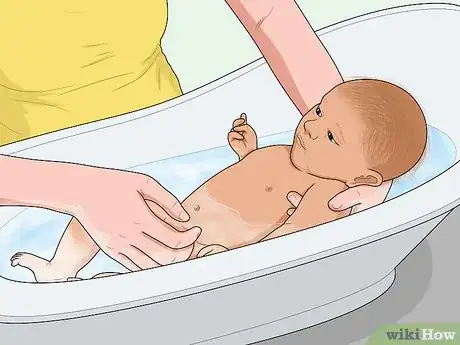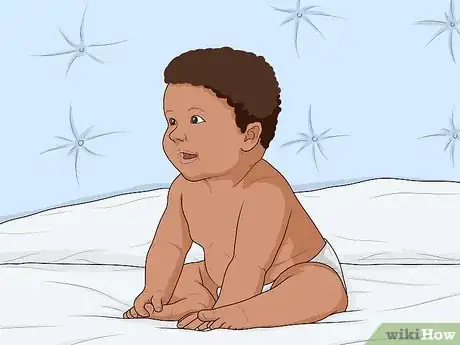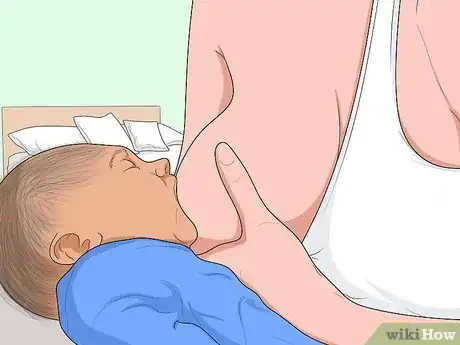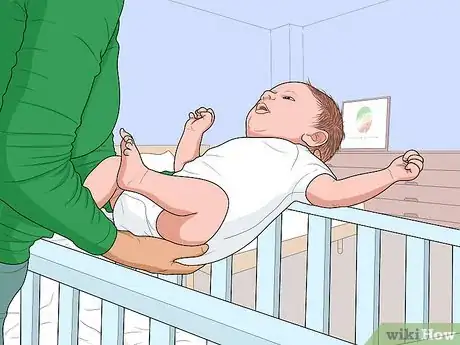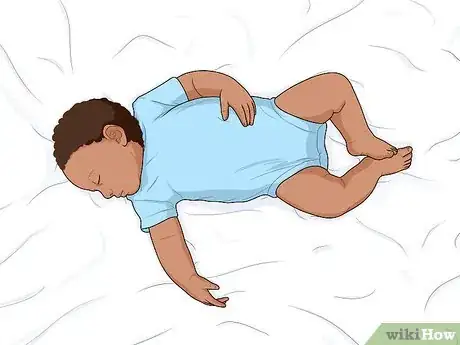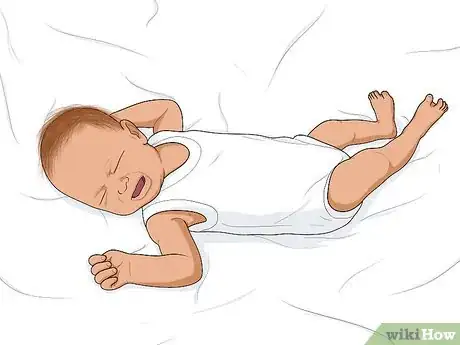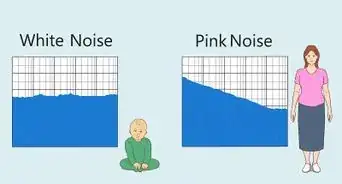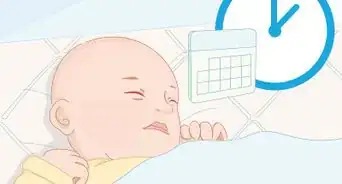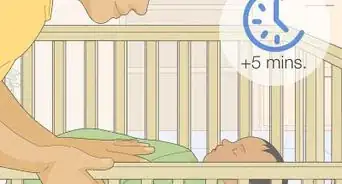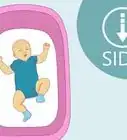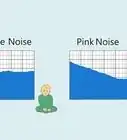This article was co-authored by Lisa Greaves Taylor, CCCE, LCCE, CD (DONA) and by wikiHow staff writer, Hannah Madden. Lisa Greaves Taylor, CCCE, LCCE, CD (DONA) is a certified childbirth educator, birth doula, and founder of Birth Matters NYC. With over 10 years of experience, Lisa specializes in labor support, postpartum wellness, and education in the first few months of parenthood. She is a certified childbirth educator with both the Childbirth Education Association of Metropolitan New York (CEA/MNY) and Lamaze International. Lisa served on CEA/MNY’s board for 5 years and was named CEA’s Ellen Chuse Childbirth Educator of the Year in 2018. Lisa is also a DONA-certified labor support doula and a professional member of Evidence Based Birth.
There are 9 references cited in this article, which can be found at the bottom of the page.
This article has been viewed 10,181 times.
If your baby can’t fall asleep without breastfeeding or having a bottle, they’ve probably gotten into a feed to sleep habit. While this routine isn’t necessarily a bad thing, it can be a little taxing on you, especially if your baby takes their time while eating. If you want to break your baby’s habit, there are a few ways you can slowly wean them off of it while keeping them happy. Eventually, your baby will be able to fall asleep on their own and stay asleep for longer stretches of time (even if it doesn’t seem like it right now!).
Steps
How do I get my baby to sleep without feeding?
-
1Establish a bedtime routine. If your child is used to eating right before they fall asleep, getting them used to a different routine can help. Try giving them a bath, changing them into pajamas, dimming the lights, and giving them a goodnight kiss or cuddle to help them fall asleep.[1] You could also try rocking your baby or walking around with them to help soothe them to sleep.[2]
-
2Shorten the length of the night feed over time. If your baby normally feeds for 15 minutes before sleeping, let them feed for 13 minutes. Keep cutting it by 2 to 3 minutes every night until eventually, they don’t need to feed to fall asleep anymore.[3]
- If your baby normally only feeds for 5 minutes or less, try simply skipping it. Since their usual feeding time is so short, they might not need the gradual weaning period.
- If your baby often wakes up in the night and wants to feed, try offering them a sippy cup of water instead of a bottle or your breast.[4]
How do I teach my baby to self settle?
-
1Put your baby to bed when they’re drowsy, but still awake. Hold your baby and cuddle them until they’re almost asleep, then gently lower them into their crib. Help them get used to falling asleep on their own instead of relying on you to soothe them.[7]
-
2Keep the lights dim and noises to a minimum. Emphasize the difference between night and day by turning off the lights, speaking quietly, and only feeding them in the bedroom at night. It will help your baby learn the difference between night and day and solidify that night time is for sleeping.[8]
-
3Help them settle if you hear real cries. After your baby is about 6 months old, they might be able to wake up and get themselves back to bed. If you hear little noises or a few grunts, wait for a few minutes to see if they fall back asleep. If they start crying, head to their room as soon as possible to soothe them back to sleep.[9]
How can I get my baby to sleep for longer stretches at a time?
-
1Let your baby sleep in their own bed. Not only is it safer for your baby, but it will also help them wake up and fall back asleep on their own. They’ll have less anxiety about waking up without you than if you’re there all the time.[10]
-
2Check on them when they fuss, but try not to intervene. If you hear a few grunts or groans, it means your baby is waking up—however, they might not need you to help them fall back asleep. Feel free to pop your head in and double-check that they’re okay, but try not to let them see you. If you hear real cries, then you can go in and comfort them.[11]
Expert Q&A
-
QuestionHow do you get a newborn to sleep through the night?
 Lisa Greaves Taylor, CCCE, LCCE, CD (DONA)Lisa Greaves Taylor, CCCE, LCCE, CD (DONA) is a certified childbirth educator, birth doula, and founder of Birth Matters NYC. With over 10 years of experience, Lisa specializes in labor support, postpartum wellness, and education in the first few months of parenthood. She is a certified childbirth educator with both the Childbirth Education Association of Metropolitan New York (CEA/MNY) and Lamaze International. Lisa served on CEA/MNY’s board for 5 years and was named CEA’s Ellen Chuse Childbirth Educator of the Year in 2018. Lisa is also a DONA-certified labor support doula and a professional member of Evidence Based Birth.
Lisa Greaves Taylor, CCCE, LCCE, CD (DONA)Lisa Greaves Taylor, CCCE, LCCE, CD (DONA) is a certified childbirth educator, birth doula, and founder of Birth Matters NYC. With over 10 years of experience, Lisa specializes in labor support, postpartum wellness, and education in the first few months of parenthood. She is a certified childbirth educator with both the Childbirth Education Association of Metropolitan New York (CEA/MNY) and Lamaze International. Lisa served on CEA/MNY’s board for 5 years and was named CEA’s Ellen Chuse Childbirth Educator of the Year in 2018. Lisa is also a DONA-certified labor support doula and a professional member of Evidence Based Birth.
Certified Doula & Childbirth Educator I don't recommend any type of sleep training for newborns until they're at least 3-6 months old. Before that point, they have a shorter sleep cycle and they're physically unable to sleep for long stretches of time.
I don't recommend any type of sleep training for newborns until they're at least 3-6 months old. Before that point, they have a shorter sleep cycle and they're physically unable to sleep for long stretches of time.
References
- ↑ https://www.nhs.uk/conditions/baby/caring-for-a-newborn/helping-your-baby-to-sleep/
- ↑ https://www.attachmentparenting.org/apifaqs/feed/nighttime
- ↑ https://raisingchildren.net.au/babies/sleep/settling-routines/night-weaning
- ↑ https://www.attachmentparenting.org/apifaqs/feed/nighttime
- ↑ https://raisingchildren.net.au/babies/sleep/solving-sleep-problems/changing-sleep-patterns
- ↑ https://thebreastfeedingcompanion.com/project/comfort-nursing/
- ↑ https://raisingchildren.net.au/newborns/sleep/settling-routines/helping-babies-sleep-settle-0-6-months
- ↑ https://raisingchildren.net.au/newborns/sleep/settling-routines/helping-babies-sleep-settle-0-6-months
- ↑ https://raisingchildren.net.au/newborns/sleep/settling-routines/helping-babies-sleep-settle-0-6-months
- ↑ https://kidshealth.org/en/parents/sleep13m.html
- ↑ https://www.nationwidechildrens.org/family-resources-education/health-wellness-and-safety-resources/helping-hands/healthy-sleep-habits-for-infants-and-toddlers
- ↑ https://www.healthychildren.org/English/ages-stages/baby/crying-colic/Pages/Responding-to-Your-Babys-Cries.aspx
